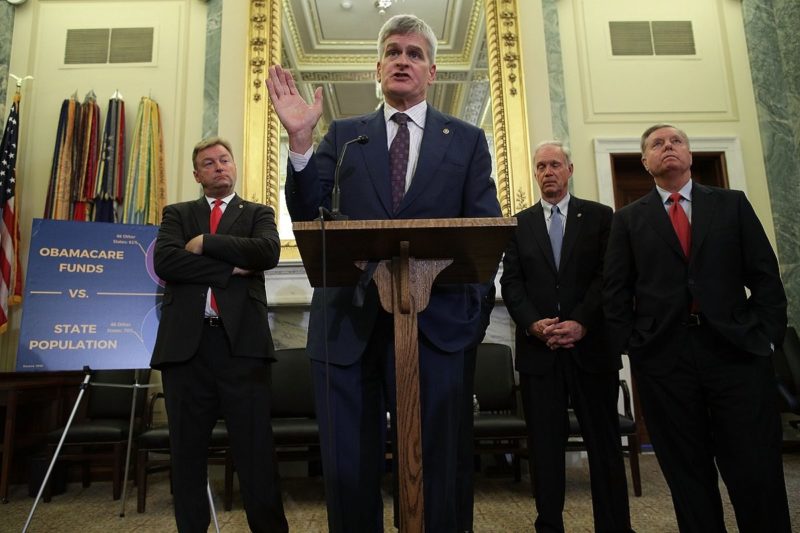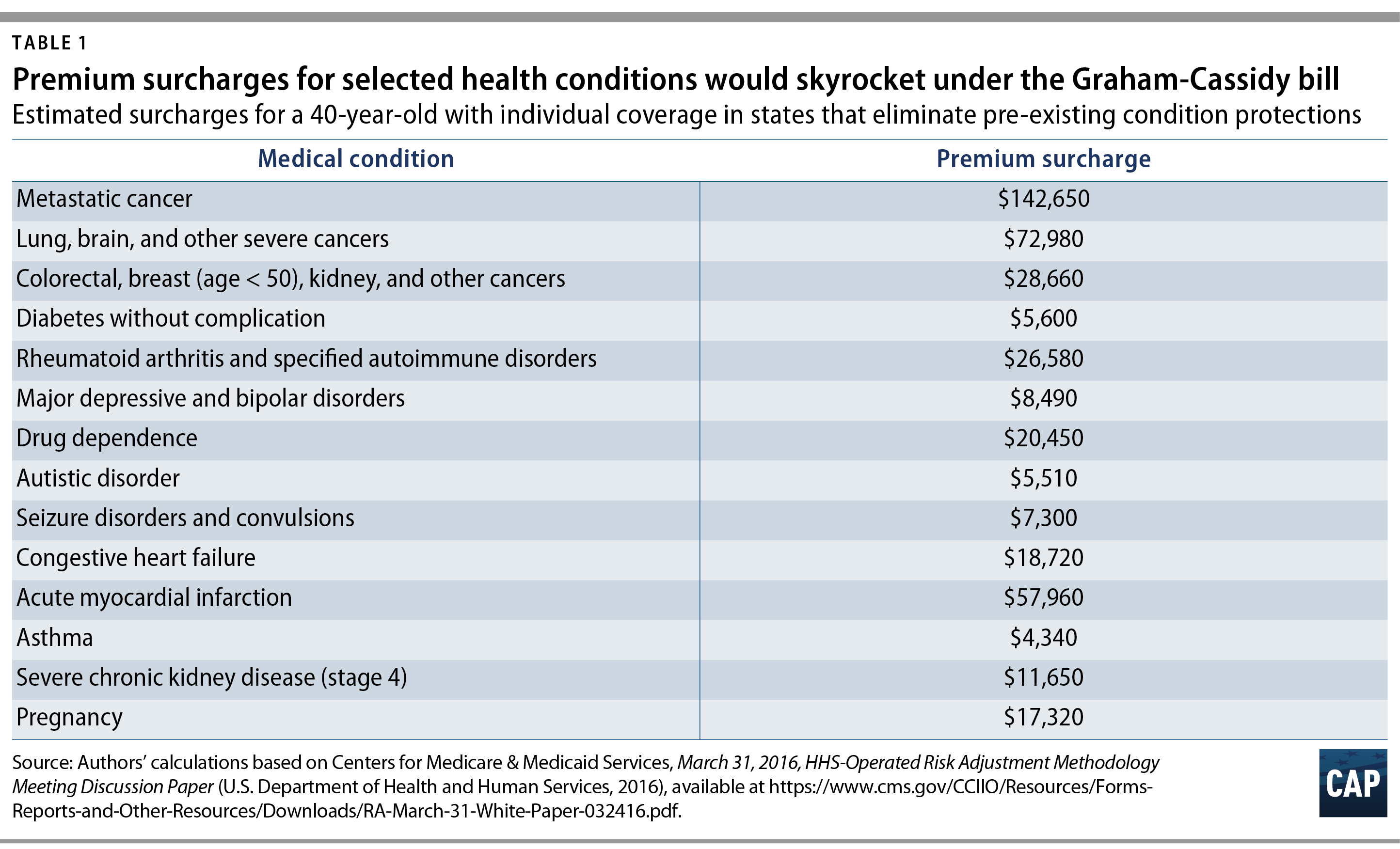GOP’s ‘Worst Health Care Bill Yet’ Takes Aim at Reproductive Health (Updated)
Funding for Planned Parenthood and abortion care remain squarely in the GOP's crosshairs as Republican leaders look for the votes to pass the latest attempt to repeal the Affordable Care Act.

UPDATE, September 22, 2:10 p.m.: Sen. John McCain (R-AZ) announced Friday afternoon that he opposes the Graham-Cassidy bill to repeal Obamacare. One more GOP senator must defect in order to kill the proposal.
Advocates for reproductive health are taking to task congressional Republicans’ latest last-ditch effort to destroy the Affordable Care Act (ACA) in the U.S. Senate.
Planned Parenthood Federation of America (PPFA), a perpetual target in efforts to repeal the ACA, or Obamacare, and other health-care groups slammed the “Graham-Cassidy” bill in statements for attacking reproductive health, from preventive care to maternity care to yes, abortion care. The bill’s namesakes and sponsors, Republican Sens. Lindsey Graham (SC) and Bill Cassidy (LA), with the help of former GOP Pennsylvania Gov. Rick Santorum, build off prior Obamacare repeal bills that Rewire reported would “defund” Planned Parenthood, waive mandatory insurer coverage of maternity care and other essential health benefits, gut Medicaid, and ban abortion coverage even in private health insurance plans.
We already knew that ACA repeal would have an outsized impact on women of color. Now, Graham-Cassidy represents “the worst health care repeal bill yet–especially for women,” according to a PPFA analysis. That assessment extends beyond cisgender women, hurting transgender and gender nonconforming people who rely, for instance, on Medicaid and Planned Parenthood, as the National Center for Transgender Equality (NCTE) stressed in an action alert. People who live at the intersections of income, race, gender identity, sexual orientation, and ability would bear the brunt of the consequences.
Senate Republicans may not be able to get away with cutting off Planned Parenthood from Medicaid reimbursements for one year and indefinitely prohibiting any health insurance plan from covering abortion. The Senate parliamentarian in July ruled that the same provisions in an earlier repeal bill violated Senate rules and would require a 60-vote supermajority that would be impossible to meet without some Democrats on board.
Anti-choice groups, including the Family Research Council, a hate group, aren’t worried about the parliamentarian’s forthcoming ruling because Graham-Cassidy phases out the ACA’s tax credits by 2021, according to Friday’s edition of the Washington Post‘s health-care newsletter. The ACA’s tax credits can currently subsidize any marketplace plan that covers abortion as long as insurers wall off abortion care into a separate fund that only draws money from individuals’ or employers’ private contributions to premiums. Republicans instead want to funnel the money through the Children’s Health Insurance Program, a Medicaid companion program that can’t cover abortion care due to the discriminatory Hyde Amendment.
If all goes according to Graham-Cassidy’s plan, the prohibition on abortion coverage would take effect as early as next year, directly affecting 9 million people, according to a report from STAT’s Erin Mershon. After 2020, “the legislation also would mandate that states that want to accept federal Medicaid and insurance money—which, under the new rules, would basically come in the form of a so-called block grant—require that no insurers in either Medicaid or the private market offer abortion coverage.”
Twenty-five states have enacted restrictions of abortion coverage in their Obamacare exchanges. Ten of those states apply the restrictions to all private health insurance plans that they regulate and are available within their borders. Three states, California, New York, and as of August, Oregon, require private plans to cover abortion care, setting up the same conflict with Graham-Cassidy as the Senate’s failed Better Care Reconciliation Act.
Senate Majority Leader Mitch McConnell (R-KY) remained on Capitol Hill for several hours on Wednesday morning, trying, and failing, to lock down the 50 votes needed to pass the repeal bill. The chamber adjourned the previous evening for the rest of the week in honor of the Rosh Hashanah holiday, returning this Monday with just five days in session before the September 30 deadline for passage. That’s the cutoff date for “reconciliation,” the fast-track process requiring a simple 51-vote majority in the Senate instead of the 60-vote threshold typically needed to bypass a filibuster and pass controversial legislation.
Policies Hurt Reproductive Health
Advocates condemned the wide range of policies that comprise Graham-Cassidy. But it’s impossible to gauge the full devastation to reproductive health and overall health care without a full assessment from the nonpartisan Congressional Budget Office (CBO). The official number crunchers for Congress announced they will attempt to issue preliminary findings by early next week but admitted they can’t “provide point estimates of the effects on the deficit, health insurance coverage, or premiums for at least several weeks.”
The last time around, CBO determined that the Senate’s “skinny repeal” would result in 22 million more people uninsured than under Obamacare over ten years. The consequences mirrored those of the U.S. House of Representatives’ American Health Care Act, which would leave 23 million more people uninsured over the same ten-year period. In retaliation, congressional Republicans have tried to discredit their own independent agency, with President Trump’s backing.
At least 32 million people could lose coverage under Graham-Cassidy, based on prior CBO assessments of repeal-without-replace, according to a preliminary left-leaning Center for Budget and Policy Priorities (CBPP) report. Both CBPP and Avalere Health found that Graham-Cassidy’s proposal to convert Medicaid to a block grant program would result in more than $200 billion in Medicaid cuts, pitting their findings against the spin from the bill’s lead sponsors. Vox’s Sarah Kliff wrote that the two senators are “using misleading numbers that hugely underestimate the deep cuts many states face under Graham-Cassidy.”
Medicaid block grant proposals have a direct, negative effect on reproductive health. They could do “irreparable damage” to the safety net of family planning providers, Rewire’s Ally Boguhn analyzed in March. And under the Graham-Cassidy proposal, states that expanded Medicaid under Obamacare “are likely to see their funding reduced and redistributed to non-expansion states through the block-grant formula,” Kliff reported for Vox. That means states in which lawmakers expanded Medicaid eligibility would be punished if GOP senators rally enough votes to jam through the Graham-Cassidy bill.
The latest Republican health-care proposal does away with provisions protecting those with pre-existing conditions. Pre-Obamacare, 43 states and the District of Columbia allowed health insurers to increase premiums based on pre-existing conditions, according to a nonpartisan Kaiser Family Foundation report.
Vox’s Kliff outlined how Graham-Cassidy gives a free pass to health insurers to upcharge people with pre-existing conditions, ranging from asthma to a history of breast cancer, through state waivers. The progressive Center for American Progress did the math to figure out the costs associated with various pre-existing conditions.

Gender dysphoria and HIV could also count as pre-existing conditions, subjecting transgender and gender nonconforming people to “sky-high premiums,” according to NCTE.
Trump nevertheless tweeted on Wednesday that Graham-Cassidy doesn’t strip coverage for pre-existing conditions and pledged to sign it.
Politics Complicate Passage
McConnell has said he’ll only proceed to a floor vote if, in fact, he has the votes, Politico reported. He can only lose two Republicans and bring in Vice President Mike Pence to break a tie, as he did when Republicans shredded federal Title X family planning safeguards for people with low incomes.
So far, the only hard, public “no” is GOP Sen. Rand Paul (KY), who doesn’t think what he called “amnesty for Obamacare” sufficiently puts health care out of reach for those with low incomes. Republican Sens. Lisa Murkowski (AK), Susan Collins (ME), and John McCain (AZ) cast the three Republican votes necessary to sink the Senate’s most recent Obamacare repeal attempt in July. Murkowski and Collins rejected the prior version’s attacks on reproductive health care, and they could do the same this time around, although Graham-Cassidy is trying to lure Murkowski’s support through a billion-dollar “Kodiak Kickback” for her state. A new draft includes three provisions “to buy” Murkowski’s support, a Senate aide told congressional reporter Hayley Byrd at The IJR, a conservative news outlet.
Though a close friend and ally of Graham, the bill’s co-author, McCain could again vote down yet another repeal bill that did not advance through “regular order”—the hearings and markups that allow for public consideration and bipartisan input.
Senate Minority Leader Chuck Schumer (D-NY) and other Democrats objected to the backroom dealings, particularly after Senate Health, Education, Labor, and Pensions (HELP) Committee Chair Sen. Lamar Alexander (R-TN) officially ended bipartisan negotiations to stabilize the Obamacare marketplaces roiled by GOP uncertainty.
“Our health care system again is threatened by a hastily constructed piece of legislation, put together in a backroom by only one party, no CBO score, no committee process, not a single public hearing,” Schumer said. “Everyone is totally in the dark about the effects of this bill, and yet there is an effort to rush it forward.”
Sen. Patty Murray (WA), the top Democrat on the HELP Committee, still thinks a deal is possible if Republicans turn their attention away from the latest repeal effort and back to strengthening current law.
Ten bipartisan governors, including Republicans John Kasich (OH) and Brian Sandoval (NV), called on Senate leaders to reject the repeal bill and renew negotiations around stabilizing Obamacare. So are insurers “infuriated that the Senate scrapped the bipartisan effort to stabilize the Obamacare markets in order to make one last-ditch effort at repeal,” according to Politico.
Prospects for Cassidy-Graham seem brighter in the even-more-partisan House, under the leadership of Speaker Paul Ryan (R-WI) and other longtime GOP foes of expanded affordable health care under Obamacare. But House Minority Leader Nancy Pelosi (D-CA) said it would be “hard to understand how any Republicans from New York, from California, from New Jersey, from a large number of states would be able to vote for this.”
“I think we have a really good chance to stop it in the House, because it does such serious violence to the health care of people in California, New York and other places,” Pelosi told reporters on Wednesday during her weekly press conference.
HuffPost’s Matt Fuller, who whips, or counts, votes via Twitter, determined that “there is definitely a pathway for House Republicans” to pass the bill.
[Thread]
Let’s take a close look at what a House vote for Graham-Cassidy might look like.
— Matt Fuller (@MEPFuller) September 20, 2017
Conservative Washington Post columnist Jennifer Rubin, a frequent Trump critic, called Graham-Cassidy “worse than the so-called repeal that failed with three GOP defections”–McCain, Murkowski, and Collins.
“If they didn’t like draconian cuts to Medicaid, they’ll like this less,” Rubin wrote. “If they didn’t like a bill jammed through at the last moment on a straight party vote, they shouldn’t like this one.”

